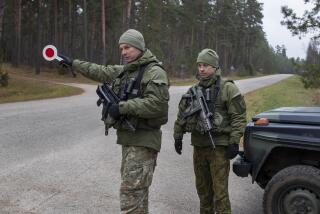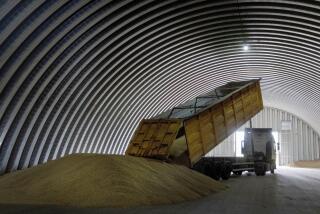Lithuanians Draft Survival Strategy : Secession: Republic sends Gorbachev a conciliatory message urging negotiations. The Kremlin’s deadline passes with no sign that resources have been cut off.
- Share via
MOSCOW — Lithuanian leaders meeting in a special session Monday drew up emergency plans for the survival of their economically dependent republic if the Kremlin carries out a threat that could effectively seal Lithuania’s borders to critically needed raw materials.
The republic’s government also approved and sent a conciliatory message to President Mikhail S. Gorbachev calling for immediate negotiations on a whole range of issues that it said were open to compromise.
“We do not lose hope for mutual goodwill and common sense in our future relations,” the message concluded.
But Lithuanian President Vytautas Landsbergis matched that conciliatory tone with tough talk.
“If our borders are blocked completely, we are going to consider this a kind of evil, a sort of aggression by the Soviet Union,” he warned at a Vilnius news conference. “I wonder if the Western countries wouldn’t respond on their own initiative to this.”
Lines formed, meanwhile, at gasoline stations in the capital city of Vilnius, causing waits of up to two hours, as edgy Lithuanians topped off their tanks in case Moscow stops supplying the republic with gasoline.
But there was no indication Monday that Gorbachev had implemented his threatened cutoff of key raw materials even though the deadline he had set expired Sunday.
Gorbachev had given Lithuania a 48-hour deadline Friday to rescind legislation and decisions “that set Lithuania in opposition to other republics and the Soviet Union as a whole,” at the risk of an economic embargo.
The Kremlin has appeared to be particularly disturbed over legislation halting the usual springtime conscription of young Lithuanian men into the Soviet army, but it also mentioned attempts to take over Soviet property and a new identification card that it said discriminates against non-Lithuanian residents of the republic.
Lithuanian leaders, however, angrily defied the ultimatum, saying that, because it arrived on Good Friday, they would not interrupt their Easter holiday to meet Gorbachev’s deadline. But the threat was worrisome and marred the holiday for many in the devoutly Catholic republic, where most factories and businesses were closed Monday.
In Washington, White House Press Secretary Marlin Fitzwater said that, while the Bush Administration is seeking to monitor developments Monday in Lithuania, “we have not received word of any significant change.”
“We believe the best plan at the moment is not to speculate on what course of action we might take,” he said.
He said the White House continues to view the situation there as “deeply disturbing.” Those were the words President Bush used to describe his concern Friday, and Fitzwater said Monday that “the situation is still playing itself out in terms of a response by Lithuania as well as any actions intended by the Soviet Union, so we would stick with those words.”
Lithuania, with a population of 3.7 million, declared its independence March 11 and since then has engaged in what Lithuanian leaders refer to as a war of nerves with Moscow. Soviet troops have taken over some buildings and paraded through Vilnius in a show of force.
Some Lithuanian army deserters also were forcefully taken into custody. But an economic embargo would be the most serious step Moscow has yet taken, one that could affect Lithuania’s very survival.
While Lithuanian leaders confirmed that they made plans Monday for how to deal with an economic embargo, they declined to be specific.
“Can you find a government in the world which is going to reveal all the information it has on such an important issue?” the republic’s trade minister, Rimantas Purtulis, asked rhetorically. “So we keep some secrets to ourselves.”
Purtulis also told reporters that Lithuania will manage to cope somehow even in the event of a halt in crucial fuel supplies from the Soviet Union.
“Perhaps a lot of people are going to have to make their scrambled eggs on electric hot plates,” he said, “but we will survive.”
The Lithuanian leadership’s response Monday to Gorbachev’s ultimatum was more conciliatory in tone than the brief and curt telegram that top officials drafted but did not send Saturday.
“The number of issues which need to be discussed are much wider than those you have mentioned,” said the response addressed to Gorbachev and Soviet Prime Minister Nikolai I. Ryzhkov.
It went on to list more than half a dozen items open for negotiation, including what to do about Lithuanian draftees and how to guarantee the rights of people living within Lithuania who want to remain Soviet citizens. Lithuanian officials repeatedly have said they are willing to discuss compromises with Moscow on every topic except the independence declaration itself.
The Lithuanian response to Moscow also asked the Kremlin to clarify what economic sanctions it intended to impose, saying, “We would not like to misinterpret them to our people and to the world.”
Gorbachev did not specify what goods and materials would be affected in any embargo. His ultimatum mentioned only “those categories of products that are sold on external markets for freely convertible currency,” but observers say petroleum products and natural gas are the most obvious commodities that fall into that category.
“For its part,” the Lithuanian telegram continued, “the government of the republic of Lithuania has advised individual plants and factories to continue to fulfill their commitment to their partners in the Soviet Union.
“We see no possibility for a solution to our existing problems other than immediate acceptance in Moscow of a delegation of the government of Lithuania.”
Lithuanian Deputy Prime Minister Romualdas Ozolas said on Lithuanian television that the republic has a 20-day supply of gasoline and a one-month supply of oil. Many factories, he said, would be forced to close within two weeks after an economic embargo because Lithuania imports 88% of its raw materials.
If workers are forced from their jobs, that is likely to weaken support for the independence movement in the republic.
On the other hand, Lithuania is self-sufficient in meat and milk production and has a virtual monopoly within the Soviet Union on electronic components for television sets. Lithuanian legislators have said they could respond by withholding electronic parts from the Soviet Union, which could create shortages of some electronic goods.
Lithuania has approached Western countries seeking to buy raw materials on credit, Trade Minister Purtulis said, but so far the republic has not signed any contracts.
Nevertheless, he said, Lithuanian leaders believe Moscow would face serious trouble in enforcing an economic blockade. He noted that half of Lithuania’s imports come from other republics instead of from the central government.
Lithuania is hoping that some of those republics, particularly those with independence aspirations of their own, would ignore a Kremlin-ordered economic boycott.
But, Purtulis concluded optimistically: “So far there are no signs of a worsening economic situation in Lithuania.”
Free-lance journalist Esther Schrader, in Vilnius, contributed to this report.
More to Read
Sign up for Essential California
The most important California stories and recommendations in your inbox every morning.
You may occasionally receive promotional content from the Los Angeles Times.











